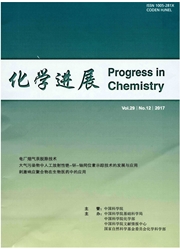

 中文摘要:
中文摘要:
开发高电压正极材料是发展高能量密度锂离子电池的重要途径之一。常规电解液在高电压下容易与正极材料表面发生副反应,影响高电压正极材料性能的发挥,因此,高电压电解液引起了人们广泛的关注。本文主要从新型溶剂体系和常规碳酸酯溶剂体系两方面对锂离子电池高电压电解液进行综述与评价,提出了现有电解液的不足及面临的问题。从电解液溶剂分子设计理论入手,分析了砜类溶剂、腈基溶剂和离子液体等新型溶剂作为高压电解液溶剂的优缺点,同时探讨了不同种类添加剂在常规碳酸酯溶剂体系中的作用机理。此外,本文还介绍了理论计算方法在锂离子电池高电压电解液研究中的应用,并对其在设计新型高电压电.解液中的应用前景拼行了展犟。
 英文摘要:
英文摘要:
The research for high-voltage cathode materials is one of important way to develop high energy density of lithium ion batteries. Electrolyte is an essential part of lithium ion batteries, which affects the electrochemical behavior through the interface reactions with the electrodes and its Li + ion diffusion characters. The conventional carbonate/LiPF6 electrolyte decomposes and tends to react with active cathode material when the voltage is higher than 4. 5 V ( vs Li/Li + ), resulting in the poor performance. Therefore, searching for high- voltage electrolytes is essential to the realization of high-voltage lithium ion batteries. The progress on high- voltage electrolyte for lithium ion batteries is reviewed in this paper. The draw back and challenge of high- voltage electrolyte are also illustrated. On the theory of designing for electrolyte solvent molecular, the performance of high-voltage electrolyte is evaluated from aspects of new solvent system electrolytes and carbonate-based electrolytes. New electrolytes based on nitrile, sulfone and ionic liquids as high-voltage electrolytes with their advantage and drawbacks are analyzed. The action mechanisms of different additives in the carbonate-based electrolytes are discussed. In addition, the application of theoretical calculation methods on high- voltage electrolyte is discussed, and the vision utilizing theoretical calculation in designing novel high-voltage electrolyte is prospected.
 同期刊论文项目
同期刊论文项目
 同项目期刊论文
同项目期刊论文
 Capacity fading mechanism during long-term cycling of over-discharged LiCoO2/mesocarbon microbeads b
Capacity fading mechanism during long-term cycling of over-discharged LiCoO2/mesocarbon microbeads b An Li-rich oxide cathode material with mosaic spinelgrain and a surface coating for high performance
An Li-rich oxide cathode material with mosaic spinelgrain and a surface coating for high performance Lithium-rich Li1.2Ni0.13Co0.13Mn0.54O2 oxide coated by Li3PO4 and carbon nanocomposite layers as hig
Lithium-rich Li1.2Ni0.13Co0.13Mn0.54O2 oxide coated by Li3PO4 and carbon nanocomposite layers as hig 期刊信息
期刊信息
